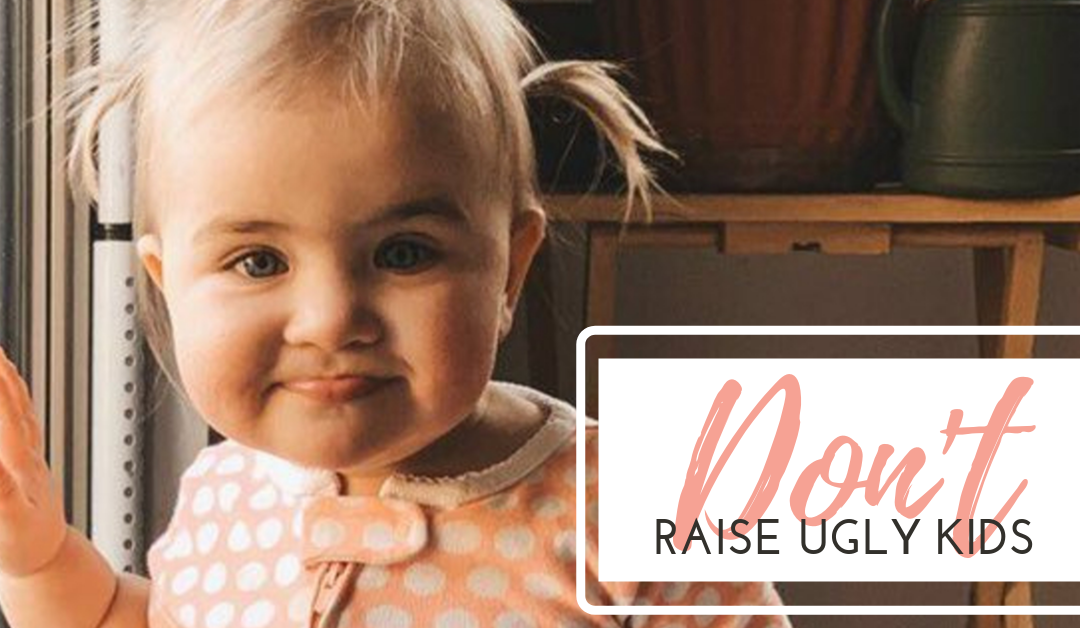What You Should Know About Your Child’s Facial Development
Why Your Child’s Facial Development Matters
Facial development matters because it can be the difference between an attractive, symmetrical, well-developed face and one without enough room for all the teeth or an airway compromise.
In my career as a myofunctional therapist, this is an area that is mind-boggling to parents. As a parent myself, I get that we are supposed to just love our babies, quirks and all. But where do we draw the line?
When I do my full lecture “Don’t Raise Ugly Kids” I teach about 6 areas that parents should understand when it comes to facial development for their child.
- Airway Awareness
- Tongue-Tie Identification
- Tongue Thrust Identification
- Mouth Breathing Prevention
- Early Ortho Intervention
- Correct Mouth Posture
In this video, I talk about three of those areas.
Airway Awareness & Your Child’s Facial Development
Having an eye for an airway concern can be lifesaving and can mean a huge advantage for your child when it comes to proper facial development. Noticing if there is a red-flag with your kiddo is the first step.
If your child exhibits any of the following, he or she should immediately see an “airway-focused doctor” or an experienced myofunctional therapist.
- Snoring
- Mouth Breathing
- Poor Attention Span
- Grinding
- Behavioral Issues
- Bedwetting
- Daytime Sleepiness
- Sleeptalking
- Sleepwalking
- Night Terrors
- Restless Sleep
- Sleeping In Unusual Positions
- Pauses or Gasps in Breathing
Remember: This may mean a second or third opinion, because your family doctor or pediatrician may not understand the huge concern with childhood sleep-disordered breathing, or the risk of overlooking obstructive sleep apnea in your child.
When your child’s face does not develop properly, ultimately this can compromise the airway. The goal is for the maxilla (upper jaw) to develop adequately in a forward, expansive fashion. The mandible (lower jaw) will follow suit, growing just a bit smaller than the maxilla (like a lid on a box). When the mandible grows forward properly, it brings with it the tongue and soft tissue, effectively increasing the space in the airway.
Tongue-Tie and Facial Development
In a nutshell, if the tongue is anchored to the floor of the mouth (incorrect tongue posture) it cannot be in the roof of the mouth, providing support for erupting teeth and helping spread the maxilla out. This can result in a high, narrow palate, altered facial development, inadequate growth of the nasal passages, crowded teeth, and airway concerns just to name a few.
The early identification and treatment of tongue-ties are very important, in conjunction with myofunctional therapy to help rehabilitate the oral structures.
If your child has any of these signs/symptoms you should be getting in touch with your favorite myofunctional therapist for a comprehensive myofunctional exam.
- Latching Issues or Inability to Breastfeed
- Colicky, Gassy, Fussy, Unsatiated, Unhappy Infant
- Failure to Thrive
- Speech Issues
- Picky
- Poor Sleep
- Snoring
- Poor Tongue Function
- Rapid Eating Behaviors
- Open Mouth Posture
- Grinding
- Digestive Issues
Mouth Breathing and Facial Development
Facial development in a mouth breather will be altered. Instead of facial development that goes forward, it will go down, resulting in that long, narrow face, high, narrow palate, and most likely crowded teeth. If you have ever looked at my facial structure, you can tell that I was a mouth breather. I have a long narrow face and a steep vertical jaw angle. It screams “help me….gravity pulled me down and I can’t get up!”
If your child is mouth breathing, then he or she has an open mouth resting posture and incorrect tongue posture. Watch your child. Can you see what I’m talking about? Not only is your mouth breathing child affecting the facial development, but he or she is also getting less oxygen. He or she is not getting the nitric oxide that helps the uptake of oxygen into the lungs. He or she is not helping put an expansive forward force on facial development. And only the sympathetic response of “fight or flight” is happening.
The earlier your child can learn to nasal breathe, the better. The window of opportunity is small when it comes to facial development. Your child’s face will be mostly developed by age 10-12, so early intervention is key!
What Is Your First Step?
Your first step to getting a really good grasp on what myofunctional impairments are present and what should be done about them.
You can download our free assessment tool to start with. Then a free 30-minute assessment appointment will give you a chance to meet me, get your questions answered and see if it makes sense for you to pay for an exam. Your child will most definitely need a comprehensive exam if he or she has any of the concerns I’ve discussed above.
Also, keep your eyes open for one of my free classes for the whole lecture of “Don’t Raise Ugly Kids”. If you are on the mailing list, you will get a personal invitation. If you aren’t sure, download the free assessment tool that I gave you the link to above, and make sure to select “yes” to receive emails!
Other great resources.
I am LIVE on Facebook most Wednesdays at 11:30 am Mountain time. I cover a huge range of topics!
I have the Tongue-Tie and Myofunctional Therapy Support Group on Facebook, which you are encouraged to join.
I have an extensive blog.
I’m growing a great YouTube channel.
I am very active on Instagram!
Are you a Facebook Fan of Integrative Myofunctional Therapy?
Sign up to down load my free assessment tool and check “yes” to get my weekly email about all things myo!
I teach a free class called: “Become a V.H.P: Your 6 Step Roadmap to Becoming a Vital Healthy Person By Understanding Your Myofunctional Impairment”. You can watch one of the video replays here.

About Carmen
Carmen found her path of passion years ago as a dental hygienist. After a stint in graduate school to earn her M.B.A., she left clinical hygiene practice to start her business, Integrative Myofunctional Therapy. In addition to seeing clients in her private online practice, she also teaches the craft of myofunctional therapy in her Myo Mastery Program, coaches dental offices on how to implement myofunctional screening into the daily practice, and speaks frequently in various settings.
Carmen is a provider for the Foundation of Airway Health, where she works diligently for the recognition, diagnosis, and treatment of airway related disorders.
In addition, she is a proud member of several professional associations that afford her the opportunity to learn so that she can help her clients. Her professional memberships include:


